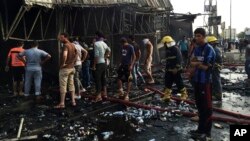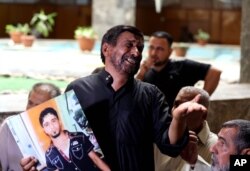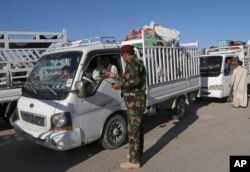Iraq is trying to cope with one of the most volatile humanitarian crises in the world as well as battling the vicious extremist Islamic State group while buckling under the low price of oil, its chief export, and growing political instability. VOA’s Sharon Behn sits down with Lise Grande, the U.N. Humanitarian Coordinator, to talk about the challenges Baghdad faces.
VOA: What has been the cost of batting Islamic State extremists?
Grande: The cost of the battle to degrade and defeat IS has been absolutely enormous in Iraq, since ISIL rose up in 2014, more than 3.4 million Iraqis have been forced to flee their homes. Many of these people have lost everything. They have lost their property, they have lost their community they have been forced into exile, the impact is absolutely dramatic. In the last year alone, we have seen 1 million people displaced, and our expectation is that as the campaign to defeat IS gains intensity, we could see up to another million people, if not more, displaced in the coming months. If you look at the percentage of the population that has been impacted directly by ISIL, we are talking about nearly a third of all Iraq he's have had to pay some kind of price.
There are 3.4 million people who have been displaced, but there are an additional 7 million Iraqis who have been [living] in host communities, who are now in trouble because they have opened up their homes, they have opened up their communities, and they're hosting families, and their own conditions have deteriorated because of that.
Altogether we have estimated that there are 10 million Iraqis right now who need some form of humanitarian assistance, and that by the end of this year that number will probably be close to 12 if not 13 million Iraqis. It is a huge number, absolutely huge.
VOA: What impact has this had on the people of Iraq?
Grande: Anytime you have so many people who have been displaced, and displaced because of horrific violence, you know, they are fleeing some of the worst human rights violations ever committed in the world. It's unbelievable the situations that they are leaving and that they are fleeing from. And in all of the circumstances, the psychological impact is almost in calculable. We will often refer to what we call a lost generation, and this is a lost generation not just of children but of young people, in fact of entire families. The dislocation that is caused, the violence and impact that that has on people, it ruins lives. People can recover, people do recover, but at the time of the crisis it is just devastating to see what is happened.
VOA: What are the chances of reconciliation after such polarization and violence?
Grande: We have to be frank that in cases where families have stayed under ISIS control there is deep suspicion about their motivations for doing that, by families who left, and when families who have left in an area return, and the families who didn't leave are still there, the issue of how you reconcile those groups, of how you prevent retaliation -- on either side -- is absolutely huge. Out of the 3.4 million people that have been displaced since ISIS rose up, 500,000 people have returned home in the past year alone. They have gone back to their communities that have been liberated from ISIL and are now under government control. And the reconciliation, the compensation element is huge in this process. We have seen that in many cases families are not prepared to go back until they know that compensation is going to be paid, that there has been an adjudication process at the community level that establishes the kinds of compensation that are necessary to prevent retaliation.
It is very important political elites and political leaders are involved in strategic reconciliation, that there is a political dispensation between all the political leaders around the country, regardless of where they come from, that unites Iraq. There is another very crucial element to reconciliation that happens at the community level and this is what I have been describing, where families and tribes and communities find ways of mending their fences, and coexisting, and living together as they did before. It's a tough process, but it's crucial.
VOA: Have displaced families been able to return to their communities that have been retaken from IS control?
Grande: When the famous city of Tikrit was liberated and came under the control of the government forces, when that happened the United Nations was able to help the local authority stabilize the area relatively quickly so families could come back, and that give us a lot of confidence that the stabilization process could be done relatively quickly and relatively inexpensively. Then Ramadi happened. And in the case of Ramadi, the town was booby-trapped. And it was booby-trapped with some of the most complex IEDs we have ever seen anywhere, and the whole town is infested and is infested in a way that is unpredictable. So, we have to go street by street, area by area, to ascertain if the place has been contaminated and if it has then to remove it so that families can return safely. This did not happen in Tikrit but it has happened in Ramadi and we are very worried that it will happen in a place like Mosul, in Fallujah and Hawija and in the other areas that are still under ISIL control.
VOA: Can you estimate the humanitarian impact of the battle for IS stronghold of Mosul, the second largest city in Iraq?
Grande: It will depend on how the battle is prosecuted. If there is limited damage, if the fighting is contained, populations are protected during that process, then we would expect that 300,000 people would be impacted. If it is [like] Ramadi, you could have more than 1 million you could have up to 1.2 million people who are going to be displaced. If their homes are destroyed, they are going to be displaced for months and months on end. If there is infestation of booby traps and complex IED's add more months to it.
VOA: Human rights organizations have voiced concern over the treatment of fleeing and displaced Sunnis, for example in Kirkuk. What is going on?
Grande: I think this issue of the security of populations is going to be central to everything that happens. It is already central in the case of Kirkuk, where you have families that have come from Hawija and the authorities have very serious concerns about whether these families may or may not have supported ISIL, may or may not have been complicit. So the element of security screening which impacts on whether families can move, when families are being screened then the authorities want them to remain in place, they don't want them to move. Our understanding with the authorities is that once the screening is done, and the family has been cleared, they should move, they are Iraqi citizens, they are allowed to move and to go into places as they choose. But the screening process itself, which is of course the right of the authorities to undertake, we have also encourage them to be clear about it, transparent about it, fair and just, about how that is done. But that is when families are being detained by the authorities. This is, as you point out, already happening in Kirkuk, it happened when families left Ramadi, it is happening with the families that are fleeing from Hit. If you have mass displacement out of Mosul, of course it will happen there as well.
VOA: Iraq has parallel security forces, the Iraqi army and Shi’ite militias grouped under the name Hashd al Shaabi or Popular Mobilization Forces, a group that has been accused of human rights abuses. How can these be reconciled?
Grande: I think there have been some very positive steps, where the Popular Mobilization Forces have been incorporated officially into the command and control structures of the Iraqi security forces, and that has brought shape and discipline to the way in which the PMF operates. From the United Nations point of view, one of the most important, crucial things that happens in any context of conflict or violence or war is respect by the parties to that conflict for international humanitarian law. This has been a point that we have raised across the spectrum with their Iraqi security forces, with all the parties to the conflict, with the Popular Mobilization Forces, helping to educate them on what their obligations are under international humanitarian law and continuing to insist that as a party to the conflict they apply the law. It is clear that there have been violations across the board. Part of our responsibility is to monitor those, to report on them and to take the crucial, most important step of advocating with the perpetrators of those violations to stop. They must be held accountable for that.
VOA: How is Iraq’s political instability affecting the situation?
Grande: One of the very important things about Iraq right now is Iraq is not just facing one crisis, it is facing three crises simultaneously. One of the largest most volatile humanitarian crises in the world is in Iraq. At the same time, the government is facing a massive security crisis as it is trying to degrade and defeat ISIL. And thirdly, the country is facing probably its worst fiscal crisis in recent history, all three of those crises are happening at the same time. Anyone of them would have been difficult to deal with. To try and address and deal with all three of them is nearly paralyzing. And I think what we have seen is that the political leaders are struggling. Struggled with one, struggled with the other, they're struggling with all three. This has created tensions and problems that have been very very hard to manage. From the humanitarian perspective, for us what matters the most is that there is a stable, transparent government, and that it upholds its responsibilities under international humanitarian law and does absolutely everything it can to make sure that people are safe and that they receive the services that they need and deserve in order to survive. That is the critical point.
VOA: Are you getting enough funds?
Grande: No.
One of the things that I have to say is disappointing and in a way it is shocking, Iraq is in the global headlines, every day when you watch international news media when you watch regional media, open a newspaper, it is clear that Iraq is one of the great stories of the moment, and yet we can't fund the humanitarian operation at even a minimum level.
Right now we are in April and we only have 20 percent of the requirements that we need for the year.
I think it's important to consider rebalancing international engagement, so that it is not simply the international community supporting the military side of things but that we are also supporting the humanitarian operation, the stabilization operation, which are the direct consequence of the military activities that are taking place.
VOA: The Iraqi government and the US government seem to have differences of opinion on the stability of Mosul Dam. What is the U.N. take on the potential of the dam collapsing?
Grande: We are certainly familiar with the U.S. analysis of Mosul Dam. We speak all the time to the government authorities about their understanding of the situation. I think the fact that The prime minister’s office very recently reached out to the United Nations Development Program and asked us to help them establish an emergency alert and warning system indicates that they share the concerns that Mosul dam may not be stable or they would not have asked us to that otherwise. We have been working with the government for the past four months to put that kind of a system in place. We have also developed a set of protocols that would activate an international response in the case of a catastrophic outburst.








